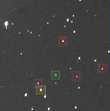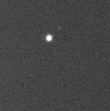 Introduction |
 Chapter 2 |
 Chapter 3 |
 Chapter 4 |
 Chapter 5 |
 Chapter 6 |
 Chapter 7 |
 Chapter 8 |
At the conclusion of my BSc, I decided not to go into high school teaching like I had originally planned. Instead I decided to undertake further study with the aim of hopefully reaching a PhD and go into university-level teaching. The idea being that such a career would allow me to fulfil my love of teaching without the discipline problems faced at the high school level and also allow me to pursue some astronomical research as well. Also, if I was able to get into teaching only astronomy, that would be even better:- getting paid to talk about my favourite hobby and to indulge in it!!!!!!! Who could ask for more!!!! :-)
The first step in this process was to undertake an extra year of study as an Honours student. This would involve half of the time studying advanced level physics courses and the rest of the time undertaking a basic research project. I was fortunate enough to be offered a project in photometry with the newly installed CCD at the Perth Observatory, and it was this project that installed in me a love for CCD photometry. The only downside was the supervisor.... one of the most obnoxious characters I have had to deal with. I had had several run-ins with him the previous year in my astrophysics course, especially at the end when he robbed me of an "A", supposedly "to keep the grade curve balanced"! As I feared, as the project progressed, he became more obnoxious, using the funds set aside for my use for his own projects, changing the requirements of the project several times, even when I writing up the results. These and other problems, eventually led me to officially complain to the department! As a result, when it came time to grade the project, this person gave me a very poor grade, but the other two reviewers were well aware of the situation and graded the project much more objectively and I achieved a sufficiently high grade to continue on towards a PhD.
Unfortunately, he had his revenge. The day after I submitted my project in for grading, he removed the computer from my office and deleted all of my data! This was most unfortunate as the only copies of the raw data and images were on that computer! One of my biggest regrets is that I have not been able to go back to the images, and re-analyse them with more modern software!
The links below connect a series of pages that are adapted from the thesis submitted at the end of the project and should serve as a useful introduction to anyone interested in all-sky CCD photometry. If anyone is interested in further reading on the subject, the best resource is still Astronomical Photometry by A. A. Henden and R. H. Kaitchuck.
Overall, I throughly enjoyed the project, despite the problems with the supervisor. A number of interesting problems and potential pitfalls in CCD photometry were identified, and it gave me a much greater appreciation of the work done by photometrists. Although it is most unlikely that photometry will ever lead the observer to a Nobel Prize, accurately measuring the brightness of celestial objects still remains one of the most fundamental and important lines of work for the observer.
One interresting sidelight of preparing this section of the webssite, has been re-reading about the problems I faced doing this work. The technology then as compared to now............. unbelievable! No internet.... no mega-gig flash drives....... DOS-based software.......... How did we ever manage to get anything accomplished??!!??
 Introduction |
 Chapter 2 |
 Chapter 3 |
 Chapter 4 |
 Chapter 5 |
 Chapter 6 |
 Chapter 7 |
 Chapter 8 |